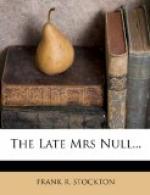“It is my opinion,” said Miss Annie, “that you ought to think more about your sprained ankle and your general health, than about having your mind settled by Miss March. I should think that keeping your blood boiling, in this way, would inflame your joints.”
“The doctor didn’t tell me what to think about,” said Lawrence. “He only said I must not walk.”
“I haven’t heard yet,” said Miss Annie, “what you would like to have to eat.” “I don’t wish to give the slightest trouble,” answered Lawrence. “What do you generally give people in such scrapes as this? Tea and toast?”
Annie laughed. “Nonsense,” said she. “What you want is the best meal you can get. Aunt said if there was anything you particularly liked she would have it made for you.”
“Do not think of such a thing,” said Lawrence. “Give me just what the family has.”
“Would you like Miss March to bring it out to you?” she asked.
“The word cruel cannot express your disposition,” said Lawrence. “I pity Mr Null.” “Poor man,” said she; “but it would be a good thing for you if you could keep your mind as quiet as his is.” And with that she went into the house.
After dinner, Miss March did come out to inquire into Mr Croft’s condition, but she was accompanied by Mrs Keswick. Lawrence invited the ladies to come in and be seated, but Roberta stood on the grass in front of the door, as Miss Annie had done, while Mrs Keswick entered the room, looked into the ice-water pitcher, and examined things generally, to see if Uncle Isham had been guilty of any sins of omission.
“Do you feel quite at ease now?” said Miss March.
“My ankle don’t trouble me,” said Lawrence, “but I never felt so uncomfortable and dissatisfied in my life.” And with these latter words he gave the lady a look which was intended to be, and which probably was, full of meaning to her.
“Wouldn’t you like some books?” said Mrs Keswick, now appearing from the back of the room. “You haven’t anything to read. There are plenty of books in the house, but they are all old.”
“I think those are the most delightful of books,” said Miss March. “I have been looking over the volumes on your shelves, Mrs Keswick. I am sure there are a good many of them Mr Croft would like to read, even if he has read them before. There are lots of queer old-time histories and biographies, and sets of bound magazines, some of them over a hundred years old. Would you like me to select some for you, Mr Croft? Or shall I write some of the titles on a slip of paper, and let you select for yourself?”
“I shall be delighted,” said Lawrence, “to have you make a choice for me; and I think the list would be the better plan, because books would be so heavy to carry about.”
“I will do it immediately,” said Miss March, and she walked rapidly to the house.
“Now then,” said Mrs Keswick, “I’ll put a chair out here on the grass, close to the door. It’s shady there, and I should think it would be pleasant for both of you, if she would sit there and read to you out of those books. She is a fine woman, that Miss March—a much finer woman than I thought she could be, before I knew her.”




